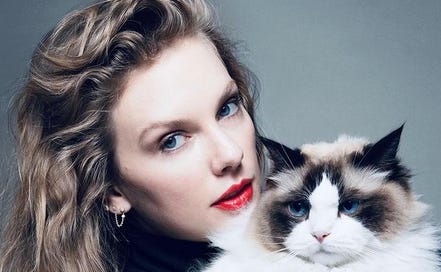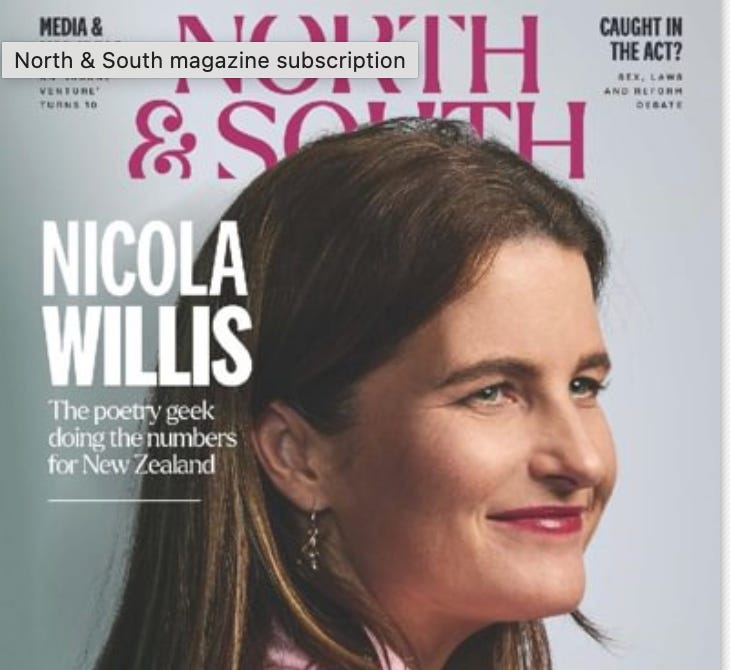First, I hope you’ll read my article about finance minister Nicola Willis in September’s North & South. It’s based on a sit-down interview she and I did in early August. If you’re not a subscriber, buy a copy from the newsstands now. Was I too harsh or too easy on her? Does she really read poetry?
Celebrity endorsements: do they work?
Much attention has been paid to Taylor Swift’s recent endorsement of the Harris/Walz ticket ahead of the November election in the US. On other side, Trump has been endorsed by Hulk Hogan and Amber Rose. The latter told the world about her conversion to Trump.
Opinion amongst political scientists and pollsters is mixed on the effects that these endorsements have. Laboratory experiments sometimes suggest they may have an effect, depending on prior identification with the celebrity, but the real-world effects are hard to measure because they can’t be unpicked from other events. It’s often said that Oprah Winfrey helped Barack Obama with her endorsement. In any case, most people may already have made up their minds, so the endorsement may be doing more to protect or enhance the reputation of the celebrity, not the endorsed party or candidate.
Swift’s endorsement did lead to a spike in voter registrations, but that may not convert into actual votes. Nonetheless, if she has had an effect on voter turnout among young people, then that’s generally to be welcomed, whether they’re reacting for or against her endorsement.
One earlier poll reported that registered voters with favourable views of Swift “picked Biden over Trump in a theoretical head-to-head matchup by 48 points, 69 percent to 21 percent”. So Swift may just be preaching to the converted. As Trump defensively pointed out, she may also lose some fans as a result, but she and her team would have made that calculation in advance. Furthermore, she had to counter fake social-media that was claiming she backed Trump.
Following Swift’s endorsement of Harris, Trump obligingly blurted out that he “hates” Taylor Swift. Conventional PR wisdom would tell him not to say anything of the sort, but Trump’s success factor seems to be his willingness to break the norms and conventions of politics. Anyway, in the unlikely event that Swift had endorsed him instead, I’m sure Trump would be loving her!
My conclusion: Celebrity endorsements play a valid part in the theatre of politics. And if there’s anyone who wouldn’t want to be endorsed by Taylor Swift, they’re free to say so. Endorsements can assist candidates, but they can also backfire, and they may be doing more for the endorser than the endorsed.
Why universities are in ruins
In a weird way, it’s comforting to read (in the Guardian) that things are as bad, if not worse, in the UK. Not only are many British universities in financial jeopardy, but they’re turning out more graduates than needed, many of whom are suffering certifiable levels of anxiety along with hopelessness and joblessness. Meanwhile, foreigners are brought in to do the jobs that they could have (or perhaps should have) been doing.
The system is “badly in need of reform” in NZ too. But the University Advisory Group set up by science minister Judith Collins has already turned into an official Zombie. Its main concern is now “quality assurance”, which is important in a way, but boils down to more bureaucracy – and thereby avoids asking the difficult questions or recommending real reform.
There’s scant recognition that “quality assurance” in traditional university education may have been rendered impossible, thanks to AI. It may not be an exaggeration to say that you can now do your degree on AI.
Is that a problem? First, cheating at university must be as old as the oldest universities. Second, students have always relied on things like textbooks – that is, stuff written by other people. The fact that AI is summarising the scholarship, rather than a qualified person in lectures and books, may be irrelevant? Well, not really, as AI now spares students the trouble of actually reading and writing very much, meaning that less knowledge is retained and skills aren’t developed. Third, I’m sure there have always been students who fact-checked their lecturers – which is a good thing to do. (Did the learned master quote Aristotle correctly?) It’s just that, now, ChatGPT can do it immediately on a smart phone.
One question for the reform – or ruin – of the university is how to bring AI constructively into the classroom and the study process, rather than try (and fail) to ban it or to catch students out for cheating. A kind of counter-espionage game has emerged between students and lecturers where the former use AI to write their assignments while the latter use AI to try to bust them for it. Why don’t they just let AIs do the writing, plagiarism-checking and even the grading, and everyone can relax and play video games instead?
Plagiarism-detection software has been expanded to detect AI-generated material, but it’s easy to circumvent it. It requires a little effort from the student, but you can start by asking ChatGPT to write in the style of an undergraduate student, which it cheerfully does, and then introduce some errors and phrases of your own. It pays to mess it up, not tidy it up, to make it look like a human product.
ChatGPT has an add-on called Consensus that does literature reviews (example below), so you can copy and paste some of that into your AI-generated essay. It may not get you an A+, but it’ll do the trick. Add in some human error and some idiosyncratic wording, and it’s unlikely to get picked up as AI-generated. The university’s incentive is to get you a pass grade anyway so they can take more of your money – and more government subsidies. After all, they have deficits to worry about. Imparting knowledge is purely incidental.
Another question is whether the “knowledge economy” push of the Blair/Clark years has led to an over-production of university graduates with “nowhere to go but overseas” (to quote the late great poet Dave Mitchell).
Change is happening to universities anyway, but not of a kind we’d call “reform” in any planned or beneficial sense.
An underlying problem is about values. The governance and management of universities have been hijacked by particular political agendas. Rather than be sites of openness, debate and learning, the universities are now sites of conformism in which people get upset if they hear anything that they might not agree with. But it’s a trend that’s ruined the culture of the university throughout “the West” – the wicked old West.
Our universities have lost touch with what it means to be a University.
The text below is AI-generated. Each hyper-linked citation (in the original format) goes through to an AI-generated page about the journal article, including the abstract.
Um, N. (2018). Effectiveness of Celebrity Endorsement Of Political Candidates. Social Behavior and Personality: an international journal. https://doi.org/10.2224/SBP.6757.







"Hulk who? Amber who?" would probably be the average response if you asked the average person who they were.
As for universities, the enshittification process is likely a side effect of them devolving from public goods (people go to uni because they want to) to perishable goods (people go to uni because they have no other choice in the job market).
Good point about how universities (and polytechs becoming universities) has created a job market over-supplied with graduates but in addition to that, a university these days is primarily a qualifications factory and is incentivised to recruit as many students as possible AND to ensure they pass. A situation that is not helped by having to cater for an increasing number of students who in 13 years of schooling have not developed adequate literacy or numeracy skills (let alone the confidence to think critically). I guess for me it is not just the oversupply of grads (a university education was seriously life-changing for me - it literally woke me up) but that too many of our grads are coming out of tertiary institutions without having developing the a rich knowledge-based understanding of the world.